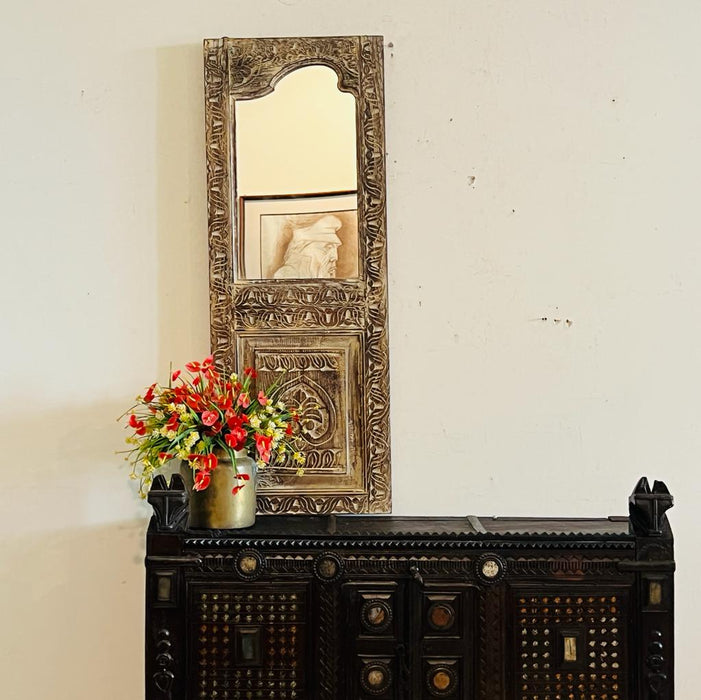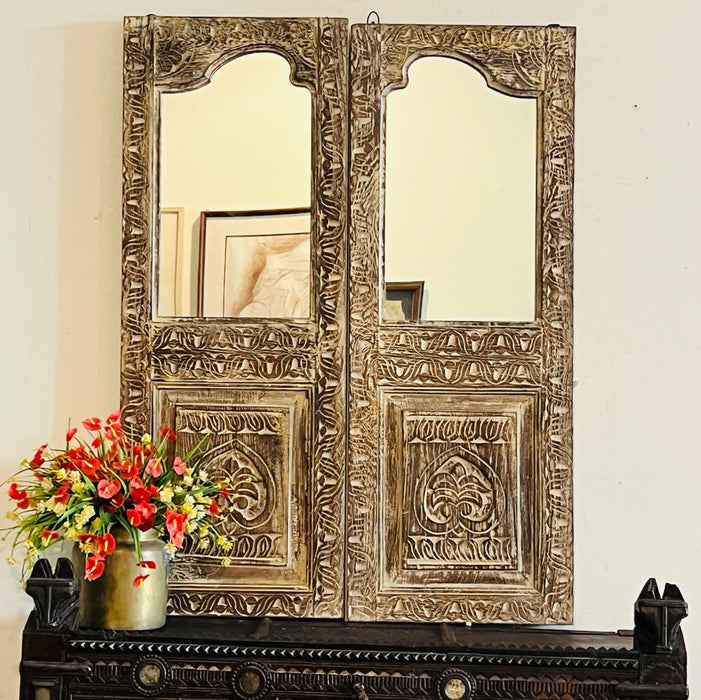Aaina (Mirror): Dua, Reflection, & Spiritual Insights
Does a simple glance in the looking glass hold the potential for profound self-reflection and spiritual awakening? Scholars, poets, and spiritual leaders across cultures have long asserted that the act of looking in the mirror is far more than a superficial gesture; it's an opportunity for introspection, gratitude, and a renewed commitment to self-improvement. The mirror, a ubiquitous object in our daily lives, serves as a portal to examine not just our physical appearance but also our inner selves, values, and aspirations.
From the bustling film sets of Bollywood to the quiet corners of spiritual contemplation, the concept of the "mirror" has echoed through various facets of human experience, prompting exploration of identity, perception, and the complexities of the human condition. This article delves into the multifaceted world of "Aaina," exploring its representations in film, literature, and spirituality, and examining the diverse ways in which individuals and communities engage with this powerful symbol.
The term "Aaina," a Hindi word that translates to "mirror," immediately evokes the image of reflection. However, "Aaina" is not merely a passive reflector of our physical forms; it becomes a canvas upon which stories are painted, dreams are realized, and societal norms are challenged. The mirror, in its many guises, invites us to confront the realities of our existence, the beauty and the flaws, and to embark on a journey of self-discovery.
- Cali Carter Reviews Booking Experiences Your Guide
- Morava River Facts History Where To Explore Central Europe
The film "Aaina," a romantic drama that captivated audiences in 1993, is a poignant narrative about two sisters, Roma and Reema, played by Amrita Singh and Juhi Chawla. This Bollywood blockbuster, directed by Deepak Sareen and produced by Yash Chopra, showcased the talents of Jackie Shroff and solidified Juhi Chawla's position as a leading lady. The story delves into the contrasting lives of the sisters, Roma's ambition and Reema's quiet introspection.
In the realm of cinema, "Aaina" became a lens through which societal expectations, family dynamics, and individual aspirations were explored. The film's success underscored the power of storytelling to resonate with audiences, prompting them to reflect on their own relationships, desires, and the choices that shape their lives. The mirror in this context becomes a symbol of self-perception, highlighting the influence of comparison, societal pressures, and the pursuit of authenticity.
Beyond the glitz and glamour of Bollywood, the "mirror" concept extends into the spiritual realm. In Islamic tradition, the act of looking in the mirror is imbued with a sense of reverence and mindfulness. The "Aaina Dekhne Ki Dua," a supplication recited while looking in the mirror, is a beautiful expression of gratitude to Allah (SWT) for the blessings of creation. This practice is a reminder of the importance of recognizing our physical gifts and striving to improve our character.
- Explore Batman Art Discover Be Inspired By Dc Comics Artwork
- Shop Billy Connolly Art Posters Prints More Discover Now
The use of the mirror in spiritual practices serves as a powerful reminder of the interconnectedness of the physical and spiritual realms. It is a tool for cultivating self-awareness, humility, and a deeper appreciation for the gifts of life. Each glance into the mirror becomes an opportunity for reflection, repentance, and a renewed commitment to living a life aligned with one's values and beliefs.
Furthermore, the "mirror" has found its place in Urdu poetry, where it serves as a metaphor for the complexities of human existence, the ephemeral nature of beauty, and the eternal quest for self-knowledge. The poets, often referred to as "shayars," use vivid imagery to create a world of symbolism and introspection.
Urdu poetry often uses the "mirror" ("Aaina," or "Sheesha") to explore the transient nature of life. The "mirror" becomes a reflection of the passage of time, the fleeting beauty of youth, and the inevitability of change. Each verse invites readers to contemplate the impermanence of all things, reminding us to cherish the present moment and to strive for inner peace amidst the challenges of the world.
Within this poetic tradition, the "mirror" is not merely a surface for reflection; it also serves as a lens through which social issues and personal struggles are examined. The poems, known as "sher," invite readers to explore themes of love, loss, injustice, and hope, offering solace and inspiration in the face of adversity. The "mirror" reflects the human condition in all its complexity.
Moving beyond literature and spirituality, the term "Aaina" finds its expression in the world of activism and social initiatives. "Aaina," a voluntary organization based in Odisha, India, embodies the spirit of reflection by working to address the vulnerabilities of society.
This organization, with its focus on vulnerable sections of society, uses the "mirror" as a tool for self-assessment, encouraging critical reflection. Their work highlights the importance of societal consciousness and the urgent need to tackle social issues.
The concept of "Aaina" isn't confined to any single interpretation or cultural expression. It manifests in diverse forms, from the reflection of film to the introspection encouraged by a mirror. The symbolic richness of "Aaina" stems from its universality: it speaks to the fundamental human experiences of self-awareness, reflection, and the constant pursuit of understanding.
The versatility of the concept, "Aaina," extends to the world of modern innovation, with the advent of smart mirrors. These mirrors, such as the "Aaina Smart LED Mirror," integrate technology like Bluetooth speakers and digital displays, seamlessly blending functionality with aesthetic appeal. Such innovations transform the everyday act of looking in the mirror into a more immersive and interactive experience.
These modern-day mirrors enable users to combine personal grooming and technological connectivity. This exemplifies the evolving understanding of the mirror as more than a static surface, but rather a dynamic tool. From the reflection of a physical appearance to the integration of technology, the mirror continues to evolve and adapts to the needs and interests of the modern world.
| Aspect | Details |
|---|---|
| Film Title | Aaina |
| Year of Release | 1993 |
| Director | Deepak Sareen |
| Producer | Yash Chopra |
| Lead Actors | Jackie Shroff, Amrita Singh, Juhi Chawla |
| Supporting Actor | Deepak Tijori |
| Genre | Romantic Drama |
| Synopsis | The film focuses on the contrasting lives of two sisters, Roma and Reema, exploring themes of ambition, self-perception, and family dynamics. |
| Impact | A blockbuster hit, solidifying Juhi Chawla's career. |
| Themes Explored | Family, relationships, societal expectations, and the pursuit of authenticity. |
| Cultural Significance | Showcased societal norms and individual aspirations, resonating with audiences. |
| Reference | Wikipedia: Aaina (1993 film) |
The diversity of interpretations of "Aaina" also reveals the ongoing human desire for self-understanding. Whether in religious practices, artistic expressions, social initiatives, or technological innovations, the "mirror" remains a symbol of our own reflection. It encourages us to look beyond the surface and see the deeper truths within ourselves and the world around us.
In the context of film, "The Pink Mirror" (Gulabi Aaina) offers a unique exploration of identity and societal taboos. Directed by Sridhar Rangayan, this film presents a colorful and often humorous perspective on the Indian homosexual experience, showcasing the lives of transsexuals and gay individuals.
| Aspect | Details |
|---|---|
| Film Title | The Pink Mirror (Gulabi Aaina) |
| Director | Sridhar Rangayan |
| Synopsis | Focuses on the lives of Indian transsexuals and a gay teenager. |
| Themes Explored | Homosexuality, societal taboos, identity. |
| Significance | Considered a landmark film in India for its focus on the LGBTQ+ community. |
| Reference | Wikipedia: The Pink Mirror |
The exploration of diverse aspects of "Aaina" provides an intricate perspective on the human experience. From the Bollywood portrayal of familial relationships to the spiritual significance of personal reflection, "Aaina" highlights our ongoing pursuit of self-awareness and a deeper understanding of our place in the world.
The concept of "Aaina," in its myriad forms, serves as a reminder that the search for identity, meaning, and purpose is an ongoing journey. Whether we are looking at ourselves in a physical mirror, reflecting on the verses of poetry, or observing the reflections of society, "Aaina" offers an opportunity for self-discovery, personal growth, and a deeper appreciation for the complexities of human existence. The power of "Aaina" lies in its invitation to delve beyond the surface, and to understand the profound interconnectedness of inner and outer worlds.
- Find Susan Clancy Profiles Research Contact Info Get The Details
- Tory Lane Office Porn Watch Now Explore Xxx Scenes

Aaina Mirror with Tile & Blocks (Price per Piece) The Deco Barn

Aaina 2 Wooden panel Mirror ( Sold Individually) — Khojcrafts

Aaina 2 Wooden panel Mirror ( Sold Individually) — Khojcrafts